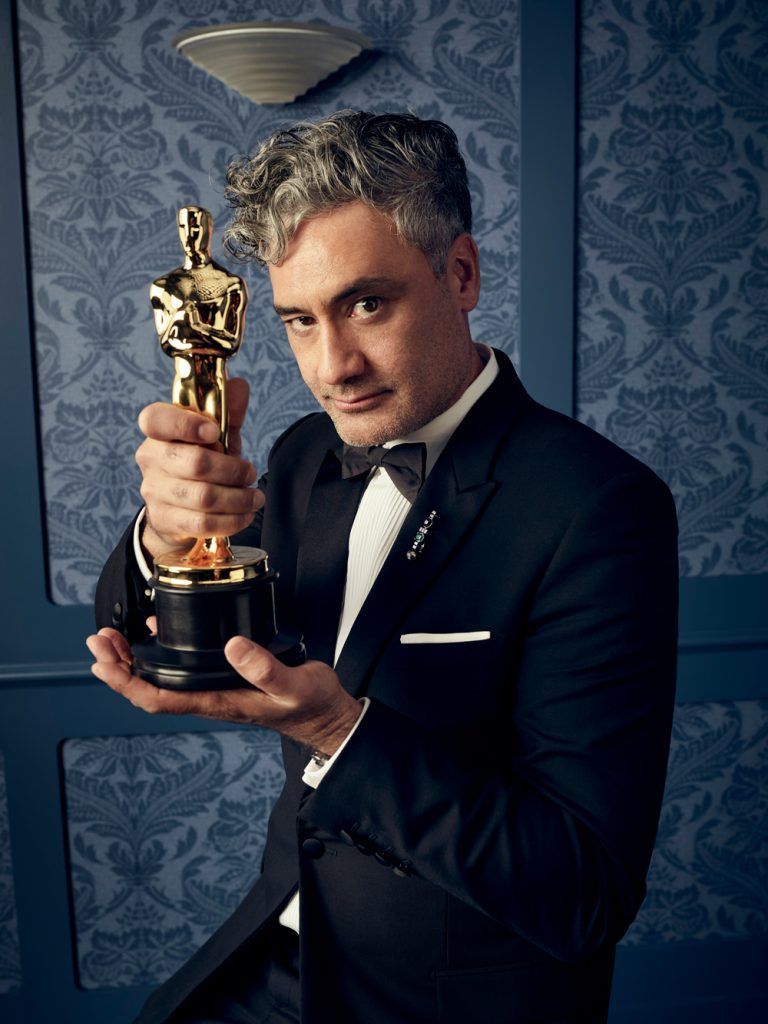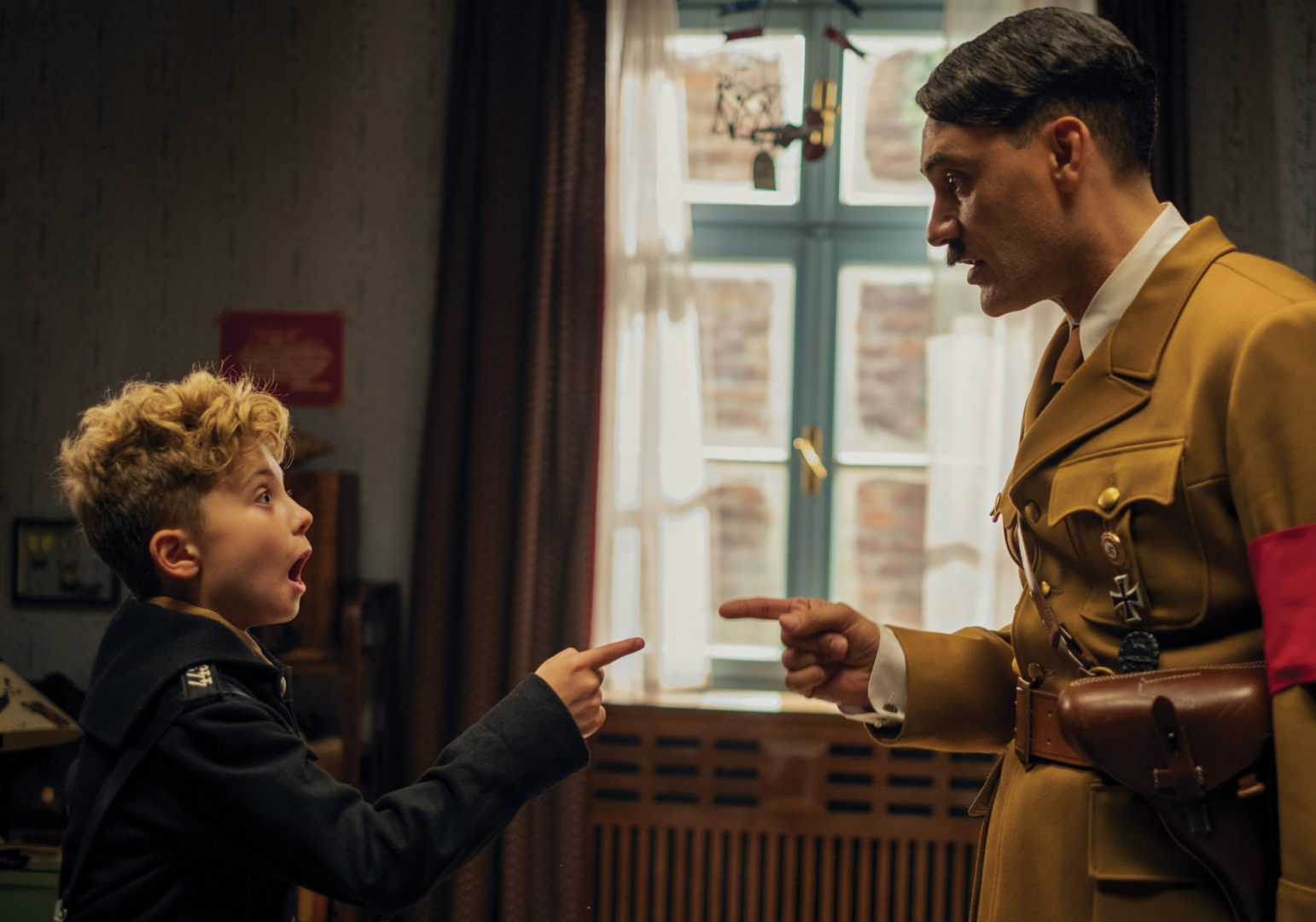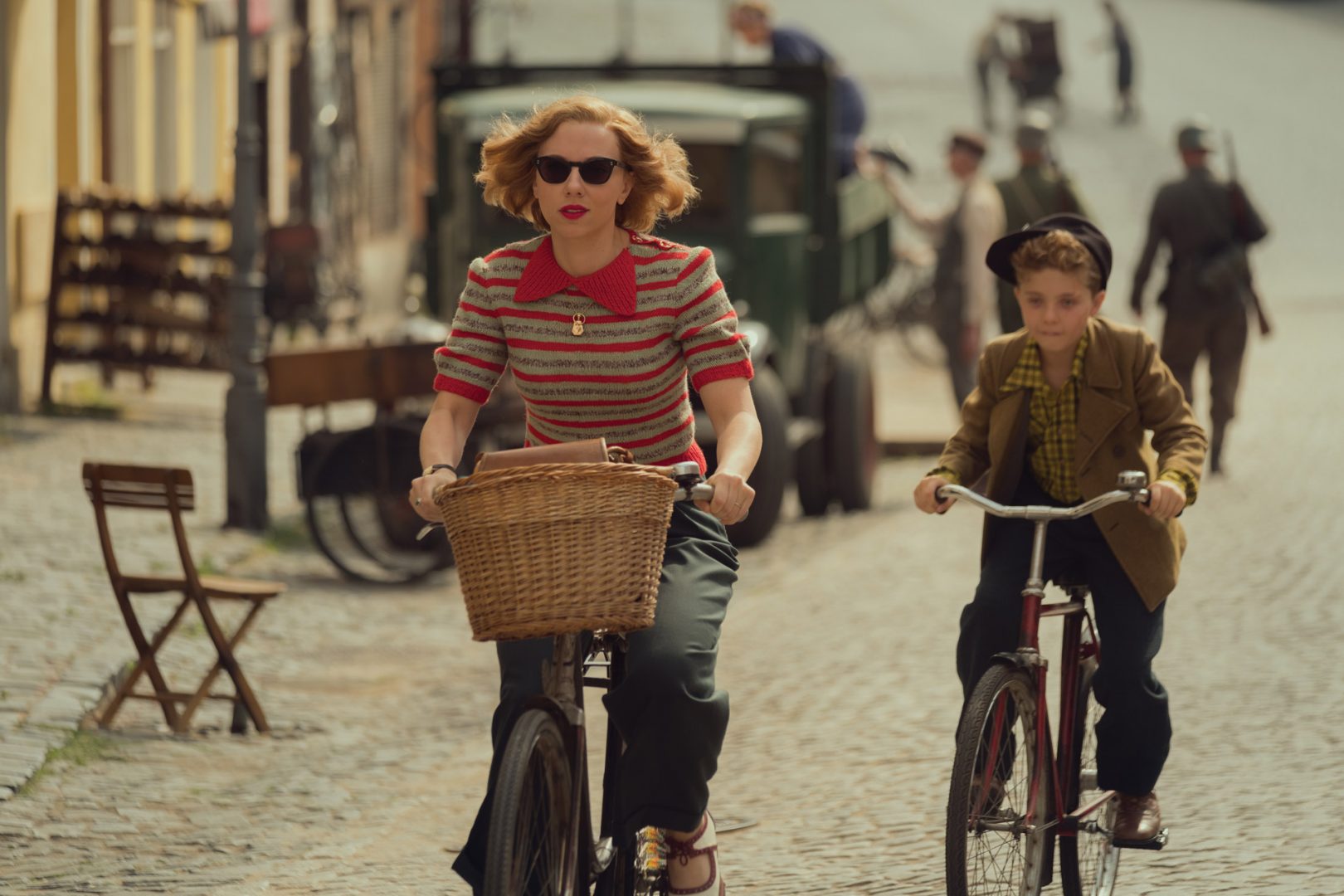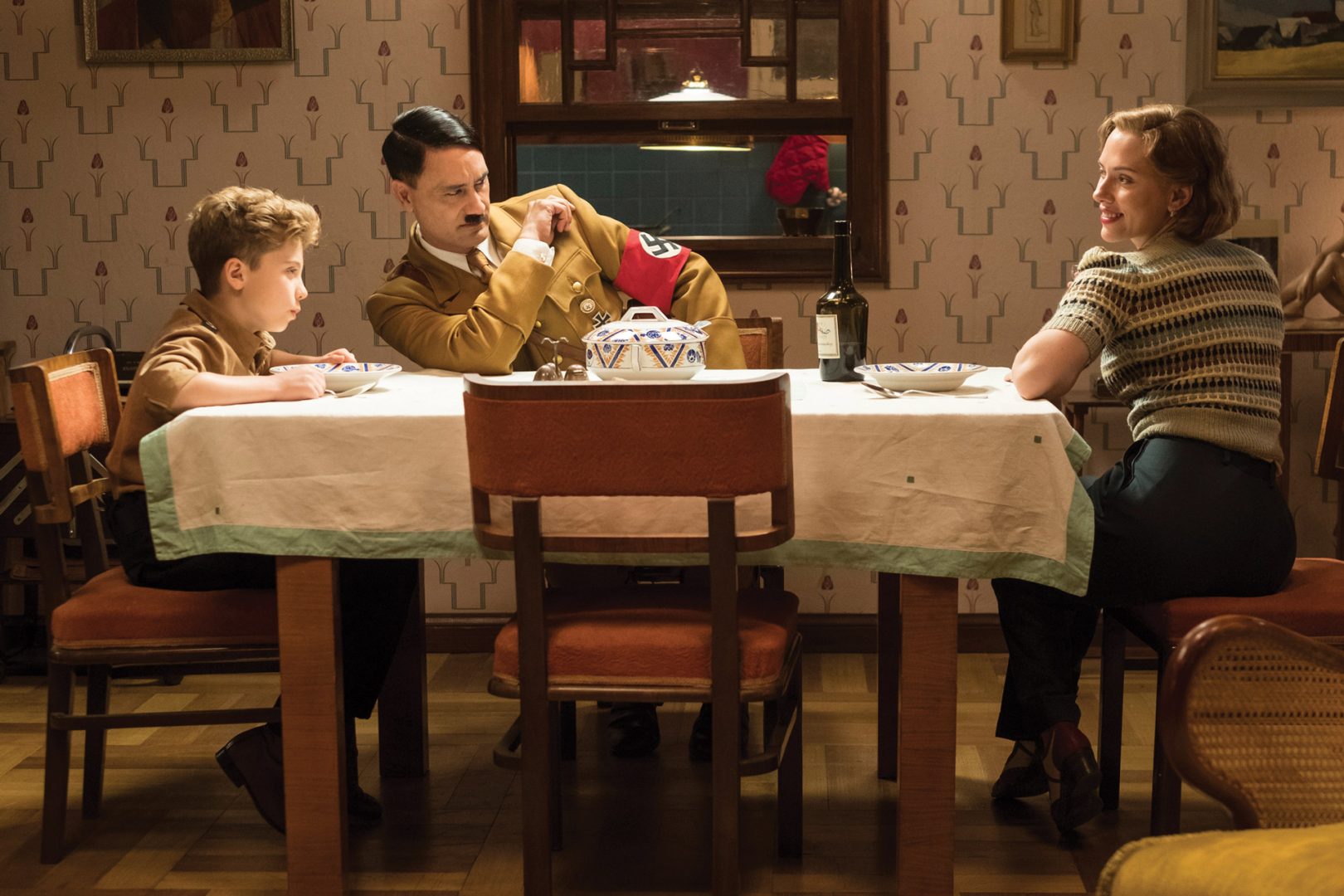Taika Vs The World
Directors seem to be one of New Zealand’s favourite exports, and our brightest star at the moment is Taika Waititi, He’s gone from indie darling to box office big hitter, but he’s never lost his roots. But times are changing and the sands that studios are built on are shifting. What does this mean for such a unique character like Waititi?
Film stills from Jojo Rabbit, in cinemas 24 October 2019
I have a friend who had a brief stint in the film industry before being slowly ejected by the normal way life does these things. Girlfriends, moving, job availability, the lack of any discernible talent. But while he was there, he remembers people buzzing about a hot new director on the block, someone going by Taika Cohen at the time. “He’s someone to keep your eye on,” they were saying. Now New Zealand can do anything but.
A good place to start is in 2004 when Taika released a 10 minute black and white short film called Two Cars, One Night. It’s a brief encounter between a of couple kids in their respective cars, waiting for their dads to get out of the local tavern. Even way back then, it has everything you expect from a Waititi movie. A hilarious script that’s unapologetically Kiwi and a sweet innocence in the face of a bleak situation. Also if the story of a quirky rural Māori kid sounds awfully familiar, it’s because it’s the prototype for what would later go onto be Boy.
A year later, he pulled the trick off again, this time in a 20 minute film about six men in the 28th Māori Battalion in an unnamed war torn city. The film has no real spoken dialogue, but still conveys all those key elements of Waititi’s style.
He started to pick up steam with Eagle Vs. Shark in 2007. Despite having Jemaine Clement on the cover, who’s own career was exploding at the time, it’s weird Napoleon Dynamite-vibes weren’t going to gell with everyone. So it instantly went into the cult classic box, rather than regular old classic box.

Then three years later Boy came out, finally a film other than Whale Rider Kiwis could be proud of. It became the highest grossing NZ film at the local box office, beating out both Whale Rider and World’s Fastest Indian. Not even Anthony Hopkins star power could pull in the numbers that a 13 year old unknown called James Rolleston could manage.
Waititi had managed national success, and now he must take on the world, as is the way of people way too talented for Aotearoa alone. What We Do In The Shadows brought back Jemaine Clement once again and got premiered at the Sundance Film Festival. It was a critical success with its limited releases across the States and abroad and has been probably his most franchisable IP to date. It spun off two TV shows; the locally made Wellington Paranormal, and an American remake of the movie as a show, which has just been greenlit for another season dropping in 2020.
I don’t think most local fans could believe their luck when it was announced that Taika would be directing Thor: Ragnarok. That’s like a REAL movie!? At the time, Chris Hemsworth was getting a little jaded and bored with his straight laced Thor. On Jimmy Kimmel, Hemsworth recalled a meeting with Taika who said “‘Let’s just break everything we know and destroy it and rebuild it,’
“By the time I got to Thor: Ragnarok, I spoke to Taika Waititi, the director on the film, and I’m like, ‘I’m just, I’m so sick of myself.’ And he’s like, ‘Yeah, I’m sick of you too,’” Hemsworth said.
Taika helped coach Hemsworth into “sort of self-deprecating, not taking yourself too seriously, and being okay with it, and kind of being comfortable in that chaotic space of uncertainty.”
Self-deprecation comes easy to us, but maybe not so much to an A-list Australian. With that said, he absolutely nailed it. Ragnarok stands as this writer’s favourite Marvel film to date, which oozes with classic comedy and a lighthearted approach to a series that has frankly gotten pretty beige.
To achieve this, Waititi threw out the rule book and the script, almost literally. In interviews, he talks dismissively of the uninspired script he’d receive. Talking to MTV he recalls, “I would say we improvised probably 80 percent of the film, or ad-libbed and threw in stuff. My style of working is I’ll often be behind the camera, or right next to the camera yelling words at people, like, ‘Say this, say this! Say it this way!’ I’ll straight-up give Anthony Hopkins a line reading. I don’t care.”

The tactic and the new breath of life paid off. Waititi’s direction helped make the film the highest grossing Thor movie in the trilogy. Now with Disney’s blessing and billions of dollars to play with, Taika’s trajectory could go anywhere.
Sure, some pundits have been taking some swings at the stem of his poppy looming over them, triggered at his temerity to ask New Zealand to pull it’s socks up and be better. This came in the form of a couple tweets and interviews with Marae. His comments covered everything from personal experiences of racial profiling, to more broad social issues.
“We’ve got a lot to learn about looking after the environment and we’ve got a lot to learn about our depression rates and our suicide rates and our teen suicide rates, child poverty numbers and the housing crisis.”
Duncan Garner labeled this “treasonous”.
Op-ed writers aren’t the only one’s Taika has drawn the ire of. He is perhaps the perfect director to frame the Disney takeover in. He’s been on both sides, and he’s at the crossroads. As a quick catchup for those not in the know, Disney has been in the process of inexorably buying up pretty much any movie studio that so much as considers itself on the table.
Earlier this year, Disney finished its acquisition of 20th Century Fox, with Alita: Battle Angel being one of the last films for the company to release by itself. This acquisition also meant Fox Searchlight got bought out, and along the way plenty of films from this studio got cut and cancelled by Disney’s brand guidelines and budgeting machete. Among these Fox Searchlight features was Jojo Rabbit, Taika’s next big hit.
Taika’s mum had introduced him to a book by Nelson-based writer Christine Leunens called Caging Skies and it hooked him immediately (after he got around to finally reading it).
“My grandfather fought against the Nazis in World War II and I’ve always been fascinated by that time and those events. When my mother told me about Christine Leunen’s book Caging Skies, I was drawn in by the fact it was told through the eyes of a German child indoctrinated into hate by adults.” he told Stuff.
“So making Jojo Rabbit has been a reminder, especially now, that we need to educate our kids about tolerance and continue to remind ourselves that there’s no place in this world for hate. Children are not born with hate, they are trained to hate.”

However, Disney was less than impressed with Variety reporting that “The scathing takedown of Nazism may, however, prove a little too edgy for Disney brass accustomed to producing movies suitable for parents and kids. Searchlight has started to screen the film for its new parent company. Halfway through one recent viewing one executive grew audibly uncomfortable, worrying aloud that the material would alienate Disney fans.”
Obviously there’s a pillar of Disney fans who are alienated by joking about Hitler and learning to love and not hate. Where can a Hitler fan go these days without having their beliefs bagged on? Twitter and Facebook, I guess…
Fox had a chance though to prove it’s worth in the form of X Men: Dark Phoenix, but after it fumbled the entire thing, they were officially in the dog box, with Disney CEO Bob Iger himself leaving a very public stern word in Fox’s direction.
“One of the biggest issues we faced in the quarter was the performance of the Fox film business,” Iger told investors. “It was well below what it had been and well below what we thought it would be when we did the acquisition.”
It’s a burning admonishment that industry insiders say is unprecedented. With that, Disney has reportedly stopped all films that were in development at Fox at the time of the acquisition, instead ordering plenty of reboots for it’s Disney+ direct to consumer Netflix competitor.
It seems likely at this point that Jojo Rabbit would never have seen the light of day if it wasn’t already pretty much finished by the time Disney held it’s destiny in its mousey hands.
Bob Iger has said that Horn and Bergman “are now redefining 20th Century Fox’s film strategy for the future, applying the same discipline and standards behind the success of Disney, Pixar, Marvel and Lucasfilm.”
By that they mean rebooting Alien over and over again and plumbing the depths of 20th Century Fox’s most beloved IP’s. and indeed the only movies that haven’t been cut in production are a Kingsman prequel, the new Terminator film and The New Mutants X Men film. Brad Pitt’s very cool Ad Astra also slipped through(if you haven’t seen it yet, definitely make sure you see it on the big screen).
With the clarity of hindsight, was that groaning Disney Exec right? I guess the answer is, ‘sort of’. It’s been Waititi’s most divisive movie to date, it’s also unapologetic in its delivery and the kids gloves are off.
The Kiwi humour is back in force as well. Kate Rodgers for Newshub puts it well “For us Kiwis, Jojo will have even more power. This kind of humour is embedded in our consciousness. I feel like we use it to soften the blow, to ease the pain – but ultimately what it does is open our hearts and minds.”
But in a world owned by Disney, can a creative like Taika be allowed to roam off the leash? Will every movie from here on out be as safe as some buttered white bread (with hundreds and thousands sprinkled on for taste)?
Only time will tell, but I personally believe Taikas indie flavour can thrive just as well in the indie space as well as it does with the big boys.
In 2021, Taika will be kicking the door down once again with Thor: Love and Thunder for Disney, but also this year he’ll hopefully start shooting a new low key film called Next Goal Wins, starring Michael Fassbender. It’s billed to be released by none other than Fox Searchlight.
Keep your eye on this one, he’s one to watch.

